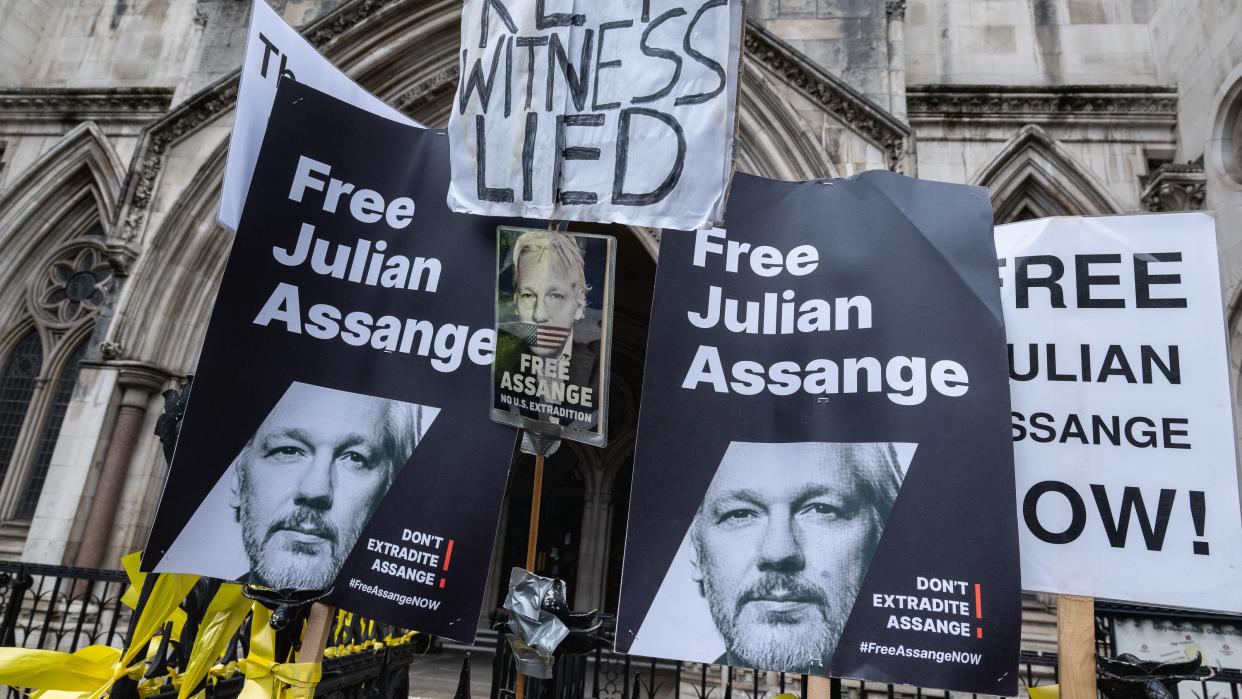What's at stake in Julian Assange's extradition fight?

- Oops!Something went wrong.Please try again later.
After more than a decade in detention and exile, Julian Assange may be on the verge of prosecution for spilling American secrets.
The WikiLeaks founder, imprisoned in the U.K. since 2019, this week faced an extradition hearing in a British court, The Associated Press said. U.S. lawyers told a judge that Assange's "bid to solicit, steal and indiscriminately publish classified U.S. government documents" put lives at risk. Assange, they said, went far beyond the bounds of journalism by encouraging leaker Chelsea Manning to steal the secret files that were published in 2010. "The allegations are that he sought to encourage theft and hacking that would benefit WikiLeaks," said one prosecutor.
But Assange's defenders said the American espionage charges are a form of "state retaliation" after being embarrassed by the WikiLeaks disclosures, the BBC said. Among its startling revelations, WikiLeaks released top-secret files on Guantanamo detainees and a video depicting the U.S. military killing Iraqi civilians and Reuters journalists from an Apache helicopter. "Mr. Assange was exposing serious criminality," said one of Assange's lawyers.
More broadly, Assange is being championed by a wide array of human rights and media groups who say the American prosecution threatens journalism and free expression, Al Jazeera said. "A successful prosecution of Assange on the basis of this indictment would criminalize a great deal of the investigative journalism that is absolutely crucial to democracy," said Columbia University's Jameel Jaffer.
What did the commentators say?
The charges against Assange are "an iniquitous threat to journalism, with global implications," The Guardian said in an editorial. "Journalists sometimes depend on whistleblowers." That's particularly true in the case of national security, where the stakes "are especially large." And those stakes now include more than Assange's freedom. A successful prosecution could be a "death blow" to investigative reporting that reveals secrets the public has a right to know. "A society that claims to uphold freedom of the press cannot possibly remain indifferent."
"Even Julian Assange's critics should defend him," Thomas Fazi said at UnHerd. WikiLeaks exposed mass surveillance programs, corruption and civilian massacres that had been kept from public scrutiny "and thus allowed to operate with impunity." Those revelations proved that "nominally democratic states are willing to bend and even break the law to silence those who threaten the status quo." The case against Assange is just another example of that phenomenon.
Given the implications, it's tough to find current press voices arguing for Assange's extradition to the U.S. The Economist made the case back in 2019. WikiLeaks "did some good in its early years," the magazine said. But the decision to publish more than 250,000 cables in 2010 "was malicious." Most of the messages revealed no misdeeds, but did put America's diplomatic sources at risk of reprisal. Later on, WikiLeaks "disseminated lurid conspiracy theories" about Hillary Clinton, publishing emails stolen from her campaign by the Russians. Bottom line? "Neither journalists nor activists, like Mr. Assange, have carte blanche to break the law in exercising their First Amendment rights."
What next?
The British government decided in 2022 that Assange could be extradited, CBS News said. In this week's hearings — before a pair of London High Court judges — Assange is seeking the right to appeal that decision to the European Court of Human Rights. No ruling came at the end of Wednesday's hearing, and the judges "could take weeks to consider" their decision.
"If the court's decision goes against Assange, he must be extradited within 28 days," CNN said. If convicted on all the charges, he faces up to 175 years in prison. Assange's wife, though, said her husband's health is brittle enough — he had a mini-stroke in 2021 — that an adverse decision could be dire. "His life is at risk every single day he stays in prison," Stella Assange said. "If he is extradited, he will die."

